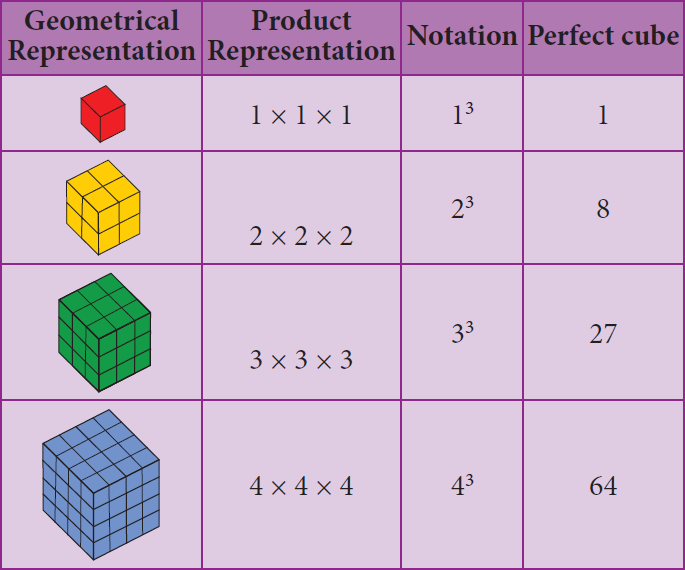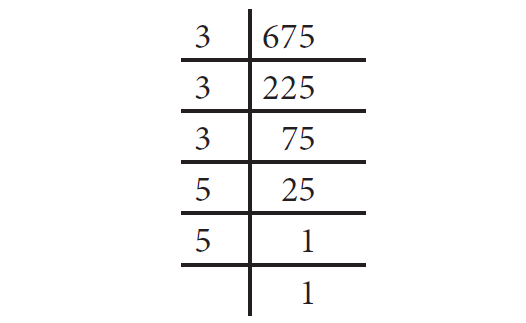CUBES AND CUBE ROOTS
Subscribe to our ▶️ YouTube channel 🔴 for the latest videos, updates, and tips.
Cubes
If you multiply a number by itself and then by itself again, the result is a cube number. Th is means that a cube number is a number that is the product of three identical numbers. If n is a number, its cube is represented by n3.
Cube numbers can be represented visually as 3D cubes comprising of single unit cubes. Cube numbers are also called as perfect cubes.
The perfect cubes of natural numbers are 1, 8, 27, 64, 125, 216, ... and so on.

Properties of Cubes of Numbers
Property 1 :
The cube of a positive number is positive.
Example :
= 53
= 5 x 5 x 5
= 125
Property 2 :
The cube of a negative number is negative.
Example :
= (-2)3
= (-2) x (-2) x (-2)
= (+4) x (-2)
= -8
Property 3 :
The cube of every even number is even.
Example :
= 43
= 4 x 4 x 4
= 64 is even
Property 4 :
The cube of every odd number is odd.
Example :
= 33
= 3 x 3 x 3
= 27 is even
Property 5 :
If a natural number ends with 0, 1, 4, 5, 6 or 9, its cube also ends with the same 0,1, 4, 5, 6 or 9 respectively.
Example :
103 = 10 x 10 x 10 = 1000
113 = 11 x 11 x 11 = 1331
143 = 14 x 14 x 14 = 2744
153 = 15 x 15 x 15 = 3375
163 = 16 x 16 x 16 = 4096
193 = 19 x 19 x 19 = 6859
Property 6 :
If a natural number ends with 2 or 8, its cube ends with 8 or 2 respectively.
Example :
123 = 12 x 12 x 12 = 1728
183 = 18 x 18 x 18 = 5832
Property 7 :
If a natural number ends with 3 or 7, its cube ends with 7 or 3 respectively.
Example :
133 = 13 x 13 x 13 = 2197
173 = 17 x 17 x 17 = 4913
Property 8 :
The sum of the cubes of first n natural numbers is equal to the square of their sum.
13 + 23 + 33 + .......... + n3 = (1 + 2 + 3 + .......... + n)2
Example :
13 + 23 + 33 + 43 = 1 + 8 + 27 + 64 = 100 ----(1)
(1 + 2 + 3 + 4)2 = (10)2 = 100 ----(2)
From (1) and (2),
13 + 23 + 33 + 43 = (1 + 2 + 3 + 4)2
Note :
• A perfect cube does not end with two zeroes.
• The cube of a two digit number may have 4 or 5 or 6 digits in it.
Cube Root
The cube root of a number is the value that when cubed gives the original number.
For example, the cube root of 27 is 3 because when 3 is cubed we get 27.
Notation :
The cube root of a number x is denoted as
Here are some more cubes and cube roots :
Cube Root of a Given Number by Prime Factorisation
Step 1 :
Resolve the given number into the product of prime factors.
Step 2 :
Make triplet groups of same primes.
Step 3 :
Choosing one from each triplet, find the product of primes to get the cube root.
Example 1 :
Is 400 a perfect cube?
Solution :
By prime factorisation, we have
400 = 2 × 2 × 2 × 2 × 5 × 5
400 = (2 × 2 × 2) × 2 × 5 × 5
There is only one triplet. To make further triplets, we will need two more 2’s and one more 5. Therefore, 400 is not a perfect cube.
Example 2 :
Find the smallest number by which 675 must be multiplied to obtain a perfect cube.
Solution :

By prime factorisation, we have
675 = 3 × 3 × 3 × 5 × 5 ----(1)
Th ere is only one triplet. To make further triplets, we will need two more 2’s and one more 5. Therefore, 400 is not a perfect cube.
Grouping the prime factors of 675 as triplets, we are left over with 5 × 5.
We need one more 5 to make it a perfect cube.
To make 675 a perfect cube, multiply both sides of (1) by 5.
675 × 5 = 3 × 3 × 3 × 5 × 5 × 5
3375 = 3 × 3 × 3 × 5 × 5 × 5
Now, 3375 is a perfect cube. Th us, the smallest required number to multiply 675 such that the new number perfect cube is 5.
Example 3 :
Find the cube root of 27000.
Solution :
By prime factorisation, we have
27000 = 2 × 2 × 2 × 3 × 3 × 3 × 5 × 5 × 5
Cube root of 27000 :
Example 4 :
Evaluate :
Solution :
Example 5 :
Evaluate :
Solution :
Subscribe to our ▶️ YouTube channel 🔴 for the latest videos, updates, and tips.
Kindly mail your feedback to v4formath@gmail.com
We always appreciate your feedback.
About Us | Contact Us | Privacy Policy
©All rights reserved. onlinemath4all.com

Recent Articles
-
Hard SAT Math Questions with Video Solutions
Feb 13, 26 07:03 AM
Hard SAT Math Questions with Video Solutions -
How to Master the SAT Math Section
Feb 13, 26 02:52 AM
How to Master the SAT Math Section -
How to Solve the Hardest SAT Math Problems
Feb 13, 26 02:24 AM
How to Solve the Hardest SAT Math Problems


